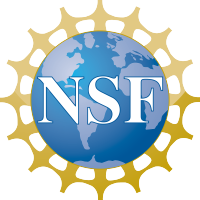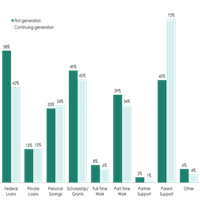Quality Research Experiences Anchor the Future of CISE Undergraduate Education
 Overview
Overview
The National Science Foundation’s (NSF) Directorate for Computer and Information Science and Engineering (CISE) makes substantial investments in promoting undergraduate research opportunities. These investments reflect the value that CISE attaches to a well-designed undergraduate research experience; it can be an essential, unifying element of a quality CISE-centric undergraduate program. In this article, CISE describes its approach to undergraduate research experiences, and calls on faculty to further promote a culture of undergraduate research within academic departments to strengthen the impact of current and future CISE investments.
With undergraduate enrollment in computing majors growing, up 24.1% from last year as reported in this year’s Taulbee Survey, we as a community have a responsibility to ensure quality research experiences for our students. Quality undergraduate research experiences are essential for students in all STEM disciplines, particularly students pursuing degrees in computer, information, and computational science and engineering. The interdisciplinary nature of computing (and closely related) disciplines has produced a new generation of students seeking blended degree programs that weave together computing and other disciplines through courses and deeper experiential learning. The rapidly evolving nature of computing disciplines coupled with the pervasive nature of computing and the explosion of computational and data-enabled approaches to problem-solving demand unifying research experiences to prepare students for the fullest career opportunities and to address workforce needs that will sustain our field’s leadership well into the future.
It is imperative that computing faculty and programs foster fundamental opportunities for all computing, information, and computational science and engineering undergraduates to participate in undergraduate research experiences. These experiences often include:
- Significant long-term engagement in a research project;
- Focused experiential learning as part of a research team often with the opportunity to use cutting-edge technologies;
- Deep learning that connects the student with multiple disciplines and the computing foundations and principles that underlie them;
- Mentoring by faculty and graduate students;
- Professional development opportunities, enhancement of oral and written communication skills, and team approaches to research and problem solving; and
- Active learning to develop expertise in the process of research and inquiry that is fundamental to moving CISE research frontiers forward.
Students who participate fully in guided undergraduate research experiences can make real contributions to research outcomes and to the discipline. At the same time, the research experiences often open the students’ views of a wider range of career options including research careers and can help increase persistence in degree programs and future work as a computing professional.
The National Science Foundation’s (NSF) Directorate for Computer and Information Sciences and Engineering (CISE) provides significant support to institutions to develop and provide exemplary research experiences to a broad range of undergraduate students both within their institutions as well as from other institutions.
CISE support of undergraduate research is reflected in three ways:
- CISE Research Experiences for Undergraduate (REU) Sites;
- REU Supplements to active CISE awards; and
- Support of undergraduate students through research awards, such as the two methods above or as part of regular research proposals.
REU supplement funding and other funding for undergraduates through research awards typically allow investigators to engage students from their own institutions in their research projects. Some investigators will include REU funding in their initial research proposals. Others will send in a supplemental funding request associated with their active CISE award. CISE typically releases a Dear Colleague Letter (DCL) -available on its website – in the late fall of each year announcing availability of REU supplemental funding.
REU Sites awards support institutions developing concentrated summer undergraduate research cohorts for 8-10 weeks in the summer. At least half of the students at each Site must come from institutions with limited undergraduate research opportunities. The funding provides student stipends, housing and subsistence, and travel to and from the Site. REU Site projects often aim to attract diverse student cohorts including students from groups traditionally under-represented in computer science, students in early years of undergraduate study, community college students, and returning veterans.
In the summer of 2016, CISE is supporting more than 70 REU Sites in 30 states. The locations and research emphases of the 2016 CISE REU Sites are available on the NSF website. The CISE REU Sites offer experiences that touch all CISE core disciplines as well as cross-cutting and interdisciplinary areas. The Sites typically receive applications from January to early March of each year for participation in the associated summer program.
In 2016 alone, CISE is investing more than $16 million through REU Sites and Supplements to support over 1,500 undergraduate researchers. This substantial investment, which does not include undergraduate students supported through research awards and beyond REU Sites and Supplements, reflects CISE’s commitment to enabling quality undergraduate education and providing opportunities to a broad, diverse range of undergraduate students.
Call to Action – Faculty Participation and Action Needed
We have more to do to broaden, deepen, and sustain CISE REU activities, particularly the REU Sites.
- We encourage faculty to promote REU opportunities to their students – and to encourage their students to apply to REU Sites that align with their interests. Talk to students directly. Work with student leaders to feature REU opportunities in student organization meetings. Have REU students make presentations about their work.
- CISE welcomes more quality REU Site proposals. The solicitation NSF 13-542, Research Experiences for Undergraduates, provides guidance on submission of a REU Site proposal. The deadline for proposals for the next competition is August 24, 2016. Proposals for new Sites led by experienced research teams offering intellectually focused research experiences in areas that are compelling and of interest to undergraduates are encouraged. Consider developing a proposal for a site at your institution.
- Visit one of the CISE REU Sites. Researchers considering proposals for new undergraduate Sites may benefit from visiting one of the active Sites during summer 2016. Such visits provide first-hand insight into the operation of both the research and logistical aspects of a REU Site.
- Promote REU opportunities and student research within computer, information, and computational science and engineering disciplinary meetings and communities. Include planned sessions and organized activities in professional meetings that highlight REU Sites related to the theme of a conference. Include undergraduate student poster or paper competitions or presentations. Make sure that CISE researchers see the possibilities for deeper broader impacts to their research projects through well-designed undergraduate research opportunities.
- Promote and encourage undergraduate research within your departments and programs. Reward exemplary undergraduate research models and efforts. Make undergraduate research participation a faculty expectation. Build the culture of undergraduate research within your department and allied research communities.
CISE recognizes that it must work with its researchers and faculty to fulfill its growing responsibility for the discipline, for science, and for society. Incorporating undergraduate research experiences as fundamental components of undergraduate education is a major element in meeting these lofty goals. We must work together to develop a culture for undergraduate research and mentorship within CISE academic departments. Making undergraduate research pervasive throughout CISE undergraduate programs will require leadership, resources, and faculty time and involvement. Embarking on such a path offers many intrinsic rewards to the academic departments and to our discipline that will pave the way for innovation and technological excellence in the exciting futures of all of our students.
For more information, contact your CISE REU Site divisional representative (Harriet Taylor – CNS (htaylor@nsf.gov), Rahul Shah – CCF (rshah@nsf.gov), Bill Bainbridge – IIS (wbainbri@nsf.gov), Sushil Prasad – ACI (sprasad@nsf.gov)). Talk over your ideas for a REU Site. Let us hear your thoughts about how CISE can enhance the impact of its investments in undergraduate research opportunities.









